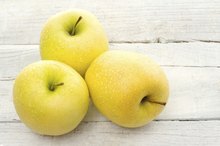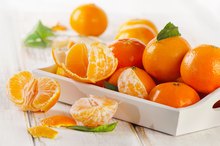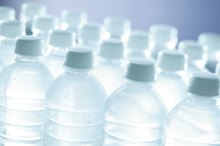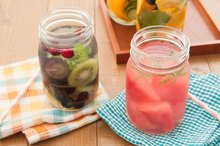The Nutrition Value of Canned Pears
You need at least two servings of fruits per day to stay healthy. Although fresh fruits are important sources of vitamins, minerals and fiber, canned fruits are a convenient alternative, and eating canned pears helps you fulfill your daily fruit requirement. When shopping for canned pears, look at the packing liquid before making your choice. Water- or juice-packed pears tend to be healthier than pears packed in heavy syrup.
Calories
Pears have a relatively high water content, meaning that they are not very energy dense. A 100-gram serving of canned pears packed in water contains 29 calories. An equivalent serving of pears packed in heavy syrup contain 74 calories. A 100-gram serving is a little less than 1/2 cup of canned pears.
- Pears have a relatively high water content, meaning that they are not very energy dense.
- A 100-gram serving of canned pears packed in water contains 29 calories.
Fat
Can You Lose Weight Eating Peaches?
Learn More
Canned pears differ in fat content depending on the liquid used to pack them. Water-packed pears contain very little fat, with only 0.03 gram of fat per 100 grams of pears. Pears packed in heavy syrup contain almost four times as much fat, at 0.13 gram per serving.
Sugar
Pears naturally contain the sugar molecules glucose and fructose. The total sugar content of water-packed pears is 6.1 grams per serving. A serving of pears in heavy syrup contains over 15 grams of sugar. This makes a serving of canned pears in syrup much less healthy than those packed in water or juice.
- Pears naturally contain the sugar molecules glucose and fructose.
- A serving of pears in heavy syrup contains over 15 grams of sugar.
Vitamins and Minerals
How to Freeze Nectarines
Learn More
Canned pears contain small amounts of vitamins and minerals. The pears contain about 1 gram of vitamin C, 0.2 milligram of iron, 53 milligrams of potassium and 4 milligrams of calcium. Canned pears also contain trace amounts of magnesium, phosphorus, zinc, copper, manganese and other minerals. Pears packed in syrup and water contain roughly equivalent amounts of these vitamins and minerals.
- Canned pears contain small amounts of vitamins and minerals.
- Pears packed in syrup and water contain roughly equivalent amounts of these vitamins and minerals.
Fiber
Dietary fiber improves gastrointestinal regularity, lowers cholesterol and reduces your risk of heart disease. One serving of canned pears contains 1.6 grams of fiber. If you eat 2,000 calories per day, you should aim for 28 grams of fiber daily 1. Eating canned pears can help you reach that goal.
- Dietary fiber improves gastrointestinal regularity, lowers cholesterol and reduces your risk of heart disease.
- One serving of canned pears contains 1.6 grams of fiber.
Related Articles
References
- U.S. Department of Agriculture: Nutrient Data Laboratory
- Reiland H, Slavin J. Systematic review of pears and health. Nutr Today. 2015;50(6):301-305. doi:10.1097/NT.0000000000000112
- Pears, raw. FoodData Central. U.S. Department of Agriculture. Published April 1, 2019.
- Soliman GA. Dietary fiber, atherosclerosis, and cardiovascular disease. Nutrients. 2019;11(5):1155. doi:10.3390/nu11051155
- Atkinson FS, Foster-Powell K, Brand-Miller JC. International Tables of Glycemic Index and Glycemic Load Values: 2008. Diabetes Care. 2008;31(12):2281-2283. doi:10.2337/dc08-1239.
- Dietary Reference Intakes (DRIs): Recommended Dietary Allowances and Adequate Intakes, Elements. National Institutes of Health, Food and Nutrition Board. Updated 2011.
- Desai V, Kaler SG. Role of copper in human neurological disorders. Am J Clin Nutr. 2008;88(3):855S-8S. doi:10.1093/ajcn/88.3.855S
- Stone MS, Martyn L, Weaver CM. Potassium intake, bioavailability, hypertension, and glucose control. Nutrients. 2016;8(7):444. doi:10.3390/nu8070444
- Carr AC, Maggini S. Vitamin C and immune function. Nutrients. 2017;9(11):1211. doi:10.3390/nu9111211
- Wedick NM, Pan A, Cassidy A et al. Dietary flavonoid intakes and risk of type 2 diabetes in US men and women. Am J Clin Nutr. 2012;95(4):925-33. doi:10.3945/ajcn.111.028894
- Larsson SC, Virtamo J, Wolk A. Total and specific fruit and vegetable consumption and risk of stroke: A prospective study. Atherosclerosis. 2013;227(1):147-52. doi:10.1016/j.atherosclerosis.2012.12.022
- Hu D, Huang J, Wang Y, Zhang D, Qu Y. Fruits and vegetables consumption and risk of stroke: A meta-analysis of prospective cohort studies. Stroke. 2014;45(6):1613-9. doi:10.1161/strokeaha.114.004836
- Anderson JW, Baird P, Davis RH, et al. Health benefits of dietary fiber. Nutr Rev. 2009;67(4):188-205. doi:10.1111/j.1753-4887.2009.00189.x
- Lee HS, Isse T, Kawamoto T, Baik HW, Park JY, Yang M. Effect of Korean pear (Pyruspyrifolia cv. Shingo) juice on hangover severity following alcohol consumption. Food Chem Toxicol. 2013;58:101-6. doi:10.1016/j.fct.2013.04.007
- Oral Allergy Syndrome (OAS) or Pollen Fruit Syndrome (PFS). American Academy of Allergy Asthma & Immunology.
- Dirty Dozen: EWG's 2019 Shopper's Guide to Pesticides in Produce. Environmental Working Group. Updated 2019.
- Pears, asian, raw. FoodData Central. U.S. Department of Agriculture. Published April 1, 2019.
Writer Bio
Lawrence Adams' work has appeared in the "Marquette Literary Review" and "Broadview Press." He has a Bachelor of Arts from Marquette University in writing-intensity English and classical studies, with a minor in biology, and a Master of Arts in creative writing from the University of Illinois at Chicago.









